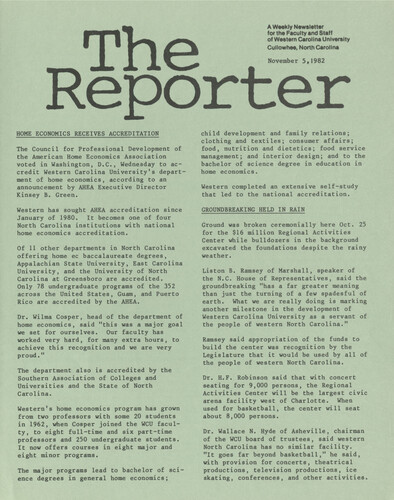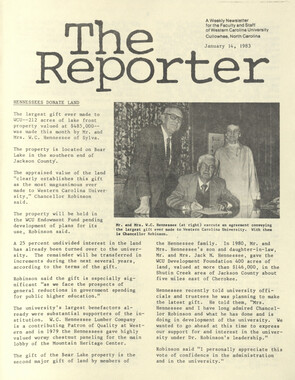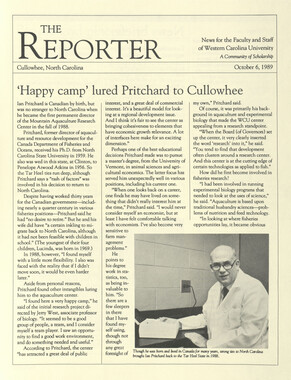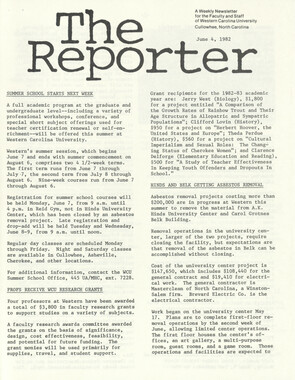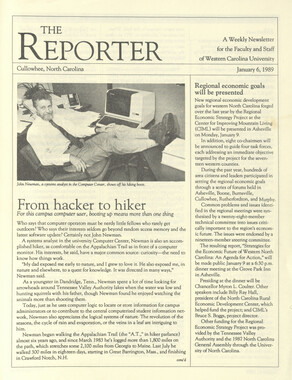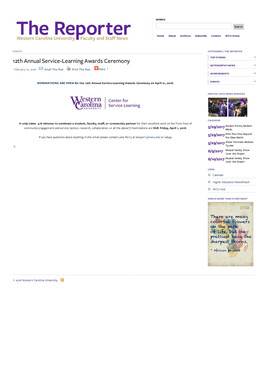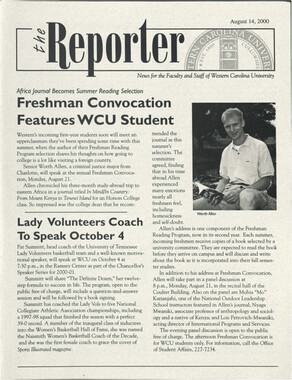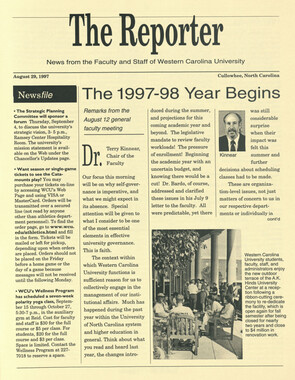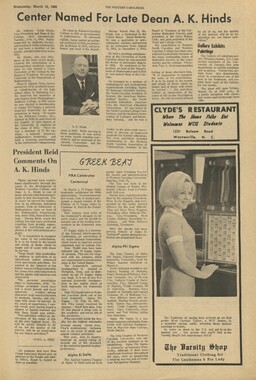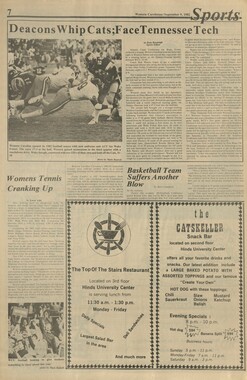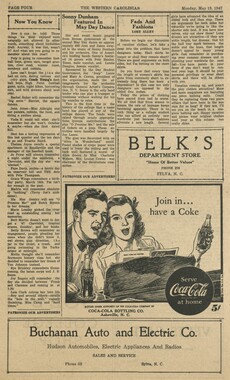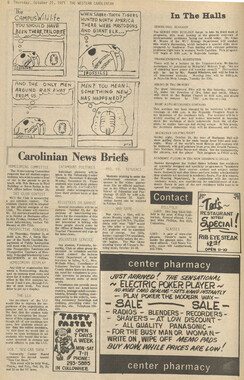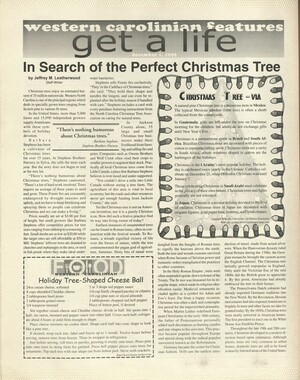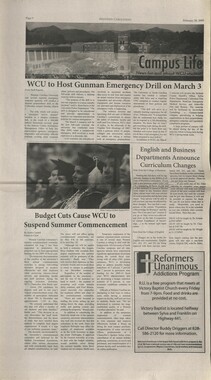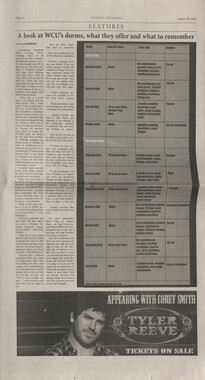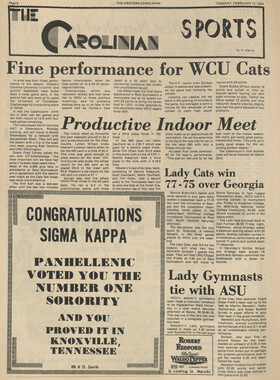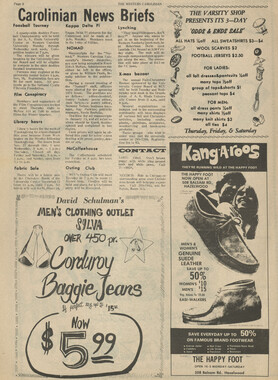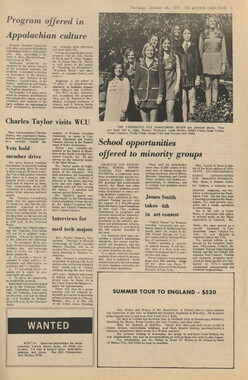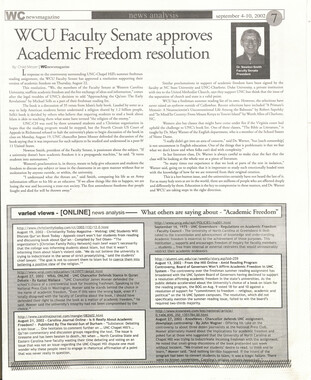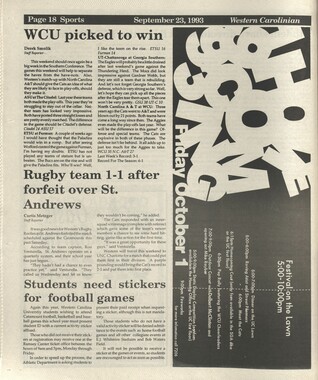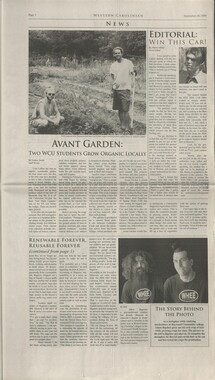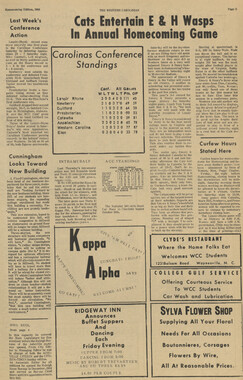Western Carolina University (20)
View all
- Canton Champion Fibre Company (2308)
- Cherokee Traditions (291)
- Civil War in Southern Appalachia (165)
- Craft Revival (1942)
- Great Smoky Mountains - A Park for America (2946)
- Highlights from Western Carolina University (430)
- Horace Kephart (941)
- Journeys Through Jackson (159)
- LGBTQIA+ Archive of Jackson County (85)
- Oral Histories of Western North Carolina (314)
- Picturing Appalachia (6873)
- Stories of Mountain Folk (413)
- Travel Western North Carolina (160)
- Western Carolina University Fine Art Museum Vitreograph Collection (129)
- Western Carolina University Herbarium (92)
- Western Carolina University: Making Memories (738)
- Western Carolina University Publications (2491)
- Western Carolina University Restricted Electronic Theses and Dissertations (146)
- Western North Carolina Regional Maps (71)
- World War II in Southern Appalachia (131)
University of North Carolina Asheville (6)
View all
- Allanstand Cottage Industries (62)
- Appalachian National Park Association (53)
- Bennett, Kelly, 1890-1974 (1463)
- Berry, Walter (76)
- Brasstown Carvers (40)
- Carver, George Washington, 1864?-1943 (26)
- Cathey, Joseph, 1803-1874 (1)
- Champion Fibre Company (233)
- Champion Paper and Fibre Company (297)
- Cherokee Indian Fair Association (16)
- Cherokee Language Program (22)
- Crowe, Amanda (40)
- Edmonston, Thomas Benton, 1842-1907 (7)
- Ensley, A. L. (Abraham Lincoln), 1865-1948 (275)
- Fromer, Irving Rhodes, 1913-1994 (70)
- George Butz (BFS 1907) (46)
- Goodrich, Frances Louisa (120)
- Grant, George Alexander, 1891-1964 (96)
- Heard, Marian Gladys (60)
- Kephart, Calvin, 1883-1969 (15)
- Kephart, Horace, 1862-1931 (313)
- Kephart, Laura, 1862-1954 (39)
- Laney, Gideon Thomas, 1889-1976 (439)
- Masa, George, 1881-1933 (61)
- McElhinney, William Julian, 1896-1953 (44)
- Niggli, Josephina, 1910-1983 (10)
- North Carolina Park Commission (105)
- Osborne, Kezia Stradley (9)
- Owens, Samuel Robert, 1918-1995 (11)
- Penland Weavers and Potters (36)
- Roberts, Vivienne (15)
- Roth, Albert, 1890-1974 (142)
- Schenck, Carl Alwin, 1868-1955 (1)
- Sherrill's Photography Studio (2565)
- Southern Highland Handicraft Guild (127)
- Southern Highlanders, Inc. (71)
- Stalcup, Jesse Bryson (46)
- Stearns, I. K. (213)
- Thompson, James Edward, 1880-1976 (226)
- United States. Indian Arts and Crafts Board (130)
- USFS (683)
- Vance, Zebulon Baird, 1830-1894 (1)
- Weaver, Zebulon, 1872-1948 (58)
- Western Carolina College (230)
- Western Carolina Teachers College (282)
- Western Carolina University (2008)
- Western Carolina University. Mountain Heritage Center (18)
- Whitman, Walt, 1819-1892 (10)
- Wilburn, Hiram Coleman, 1880-1967 (73)
- Williams, Isadora (3)
- Cain, Doreyl Ammons (0)
- Crittenden, Lorraine (0)
- Rhodes, Judy (0)
- Smith, Edward Clark (0)
- Appalachian Region, Southern (2569)
- Asheville (N.C.) (1923)
- Avery County (N.C.) (26)
- Blount County (Tenn.) (195)
- Buncombe County (N.C.) (1672)
- Cherokee County (N.C.) (283)
- Clay County (N.C.) (555)
- Graham County (N.C.) (236)
- Great Smoky Mountains National Park (N.C. and Tenn.) (519)
- Haywood County (N.C.) (3569)
- Henderson County (N.C.) (70)
- Jackson County (N.C.) (4912)
- Knox County (Tenn.) (35)
- Knoxville (Tenn.) (13)
- Lake Santeetlah (N.C.) (10)
- Macon County (N.C.) (420)
- Madison County (N.C.) (215)
- McDowell County (N.C.) (39)
- Mitchell County (N.C.) (132)
- Polk County (N.C.) (35)
- Qualla Boundary (982)
- Rutherford County (N.C.) (76)
- Swain County (N.C.) (2182)
- Transylvania County (N.C.) (270)
- Watauga County (N.C.) (12)
- Waynesville (N.C.) (86)
- Yancey County (N.C.) (72)
- Aerial Photographs (3)
- Aerial Views (60)
- Albums (books) (4)
- Articles (1)
- Artifacts (object Genre) (228)
- Bibliographies (1)
- Biography (general Genre) (2)
- Cards (information Artifacts) (38)
- Clippings (information Artifacts) (191)
- Copybooks (instructional Materials) (3)
- Crafts (art Genres) (622)
- Depictions (visual Works) (21)
- Design Drawings (1)
- Drawings (visual Works) (185)
- Envelopes (73)
- Exhibitions (events) (1)
- Facsimiles (reproductions) (1)
- Fiction (general Genre) (4)
- Financial Records (12)
- Fliers (printed Matter) (67)
- Glass Plate Negatives (381)
- Guidebooks (2)
- Internegatives (10)
- Interviews (815)
- Land Surveys (102)
- Letters (correspondence) (1013)
- Manuscripts (documents) (618)
- Maps (documents) (177)
- Memorandums (25)
- Minutes (administrative Records) (59)
- Negatives (photographs) (6090)
- Newsletters (1290)
- Newspapers (2)
- Notebooks (8)
- Occupation Currency (1)
- Paintings (visual Works) (1)
- Pen And Ink Drawings (1)
- Periodicals (193)
- Personal Narratives (10)
- Photographs (12976)
- Plans (maps) (1)
- Poetry (5)
- Portraits (4568)
- Postcards (329)
- Programs (documents) (181)
- Publications (documents) (2443)
- Questionnaires (65)
- Relief Prints (26)
- Sayings (literary Genre) (1)
- Scrapbooks (282)
- Sheet Music (2)
- Slides (photographs) (402)
- Songs (musical Compositions) (2)
- Sound Recordings (796)
- Specimens (92)
- Speeches (documents) (18)
- Tintypes (photographs) (8)
- Transcripts (322)
- Video Recordings (physical Artifacts) (23)
- Text Messages (0)
- A.L. Ensley Collection (275)
- Appalachian Industrial School Records (7)
- Appalachian National Park Association Records (336)
- Axley-Meroney Collection (2)
- Bayard Wootten Photograph Collection (20)
- Bethel Rural Community Organization Collection (7)
- Blumer Collection (5)
- C.W. Slagle Collection (20)
- Canton Area Historical Museum (2110)
- Carlos C. Campbell Collection (462)
- Cataloochee History Project (64)
- Cherokee Studies Collection (4)
- Daisy Dame Photograph Album (5)
- Daniel Boone VI Collection (1)
- Doris Ulmann Photograph Collection (112)
- Elizabeth H. Lasley Collection (1)
- Elizabeth Woolworth Szold Fleharty Collection (4)
- Frank Fry Collection (95)
- George Masa Collection (173)
- Gideon Laney Collection (452)
- Hazel Scarborough Collection (2)
- Hiram C. Wilburn Papers (28)
- Historic Photographs Collection (236)
- Horace Kephart Collection (861)
- Humbard Collection (33)
- Hunter and Weaver Families Collection (1)
- I. D. Blumenthal Collection (4)
- Isadora Williams Collection (4)
- Jesse Bryson Stalcup Collection (47)
- Jim Thompson Collection (224)
- John B. Battle Collection (7)
- John C. Campbell Folk School Records (80)
- John Parris Collection (6)
- Judaculla Rock project (2)
- Kelly Bennett Collection (1482)
- Love Family Papers (11)
- Major Wiley Parris Civil War Letters (3)
- Map Collection (12)
- McFee-Misemer Civil War Letters (34)
- Mountain Heritage Center Collection (4)
- Norburn - Robertson - Thomson Families Collection (44)
- Pauline Hood Collection (7)
- Pre-Guild Collection (2)
- Qualla Arts and Crafts Mutual Collection (12)
- R.A. Romanes Collection (681)
- Rosser H. Taylor Collection (1)
- Samuel Robert Owens Collection (94)
- Sara Madison Collection (144)
- Sherrill Studio Photo Collection (2558)
- Smoky Mountains Hiking Club Collection (616)
- Stories of Mountain Folk - Radio Programs (374)
- The Reporter, Western Carolina University (510)
- Venoy and Elizabeth Reed Collection (16)
- WCU Gender and Sexuality Oral History Project (32)
- WCU Mountain Heritage Center Oral Histories (25)
- WCU Oral History Collection - Mountain People, Mountain Lives (71)
- WCU Students Newspapers Collection (1923)
- Western North Carolina Tomorrow Black Oral History Project (69)
- William Williams Stringfield Collection (2)
- Zebulon Weaver Collection (109)
- African Americans (390)
- Appalachian Trail (35)
- Artisans (521)
- Cherokee art (84)
- Cherokee artists -- North Carolina (10)
- Cherokee language (21)
- Cherokee pottery (101)
- Cherokee women (208)
- Church buildings (189)
- Civilian Conservation Corps (U.S.) (111)
- College student newspapers and periodicals (2012)
- Dams (107)
- Dance (1023)
- Education (222)
- Floods (61)
- Folk music (1015)
- Forced removal, 1813-1903 (2)
- Forest conservation (220)
- Forests and forestry (1184)
- Gender nonconformity (4)
- Great Smoky Mountains National Park (N.C. and Tenn.) (181)
- Hunting (45)
- Landscape photography (25)
- Logging (119)
- Maps (83)
- Mines and mineral resources (8)
- North Carolina -- Maps (18)
- Paper industry (38)
- Postcards (255)
- Pottery (135)
- Railroad trains (72)
- Rural electrification -- North Carolina, Western (3)
- School integration -- Southern States (2)
- Segregation -- North Carolina, Western (5)
- Slavery (5)
- Sports (452)
- Storytelling (243)
- Waterfalls -- Great Smoky Mountains (N.C. and Tenn.) (66)
- Weaving -- Appalachian Region, Southern (280)
- Wood-carving -- Appalachian Region, Southern (328)
- World War, 1939-1945 (173)
The Reporter, November 1982
-
The Reporter is a publication produced by Western Carolina University featuring news, events, and campus community updates for faculty and staff. The publication began in August of 1970 and continues digitally today. Click on the link in the “Related Mate
-
-
The A Weekly Newsletter for the Faculty and Staff of Western Carolina University Cullowhee, North Carolina November 5,1982 HOME ECONOMICS RECEIVES ACCREDITATION The Council for Professional Development of the American Home Economics Association voted in Washington, D.C., Wednesday to accredit Western Carolina University's department of home economics, according to an announcement by AHEA Executive Director Kinsey B. Green. Western has sought AHEA accreditation since January of 1980. It becomes one of four North Carolina institutions with national home economics accreditation. Of 11 other departments in North Carolina offering home ec baccalaureate degrees, Appalachian State University, East Carolina University, and the University of North Carolina at Greensboro are accredited. Only 78 undergraduate programs of the 352 across the United States, Guam, and Puerto Rico are accredited by the AHEA. Dr. Wilma Cosper, head of the department of home economics, said "this was a major goal we set for ourselves. Our faculty has worked very hard, for many extra hours, to achieve this recognition and we are very proud." The department also is accredited by the Southern Association of Colleges and Universities and the State of North Carolina. Western's home economics program has grown from two professors with some 20 students in 1962, when Cosper joined the WCU faculty, to eight full-time and six part-time professors and 250 undergraduate students. It now offers courses in eight major and eight minor programs. The major programs lead to bachelor of science degrees in general home economics; child development and family relations; clothing and textiles; consumer affairs; food, nutrition and dietetics; food service management; and interior design; and to the bachelor of science degree in education in home economics. Western completed an extensive self-study that led to the national accreditation. GROUNDBREAKING HELD IN RAIN Ground was broken ceremonially here Oct. 25 for the $16 million Regional Activities Center while bulldozers in the background excavated the foundations despite the rainy weather. Liston B. Ramsey of Marshall, speaker of the N.C. House of Representatives, said the groundbreaking "has a far greater meaning than just the turning of a few spadesful of earth. What we are really doing is marking another milestone in the development of Western Carolina University as a servant of the people of western North Carolina." Ramsey said appropriation of the funds to build the center was recognition by the Legislature that it would be used by all of the people of western North Carolina. Dr. H.F. Robinson said that with concert seating for 9,000 persons, the Regional Activities Center will be the largest civic arena facility west of Charlotte. When used for basketball, the center will seat about 8,000 persons. Dr. Wallace N. Hyde of Asheville, chairman of the WCU board of trustees, said western North Carolina has no similar facility. "It goes far beyond basketball," he said, with provision for concerts, theatrical productions, television productions, ice skating, conferences, and other activities. 2 Hyde said Ramsey and Robinson deserve the credit for turning the idea of the center into a reality. Hyde, Ramsey, and Robinson shared the honors in wielding the symbolic spades to break ground. Ramsey used the occasion to pay special tribute to Western for its outreach programs. "This university has never considered itself an island," he said, "but has constantly reached out to help improve the quality of life in the entire region. In the process, Western has earned a statewide reputation as one of North Carolina's great universities, but it has never forgotten its basic mission of serving western North Carolina." "This fine new center will give Western an even greater outreach, enabling it to serve the people's social, cultural, and recreational needs as well as their educational needs. It will be a valuable addition to the total resources of western North Carolina." Ramsey said it was because the Legislature realized this that it appropriated $16 million for the center. "We had only $45 million to allocate for capital projects in the 1982-83 fiscal year at all 16 state-supported universities. The fact that more than one-third of the total availability was earmarked for this center shows clearly that it is a sound investment that will return good dividends," he said. The project was designed by Crain/Anderson of Houston, Tex., and Foy and Lee Associates of Waynesville. Noonan-Kellos Construction Company of Augusta, Ga., is the general contractor. On hand for the groundbreaking ceremonies were representatives of contracting and architectural firms involved in the project and a number of civic, government, and political leaders. The huge structure was designed in less than a year, setting a record for UNC system projects. A fast-paced construction schedule also has been set, calling for completion in time for the 1984 fall basketball schedule. A "dedication game" already has been scheduled with N.C. State in the facility Dec. 8, 1984. MATHEWS AND JOYNER RECEIVE NEH GRANT Two WCU professors have received a $40,000 grant from the National Endowment for the Humanities to write a book that analyzes southern Appalachian women from a literary and historical perspective. The proposed book by Dr. Alice E. Mathews, a history professor, and Dr. Nancy C. Joyner, an English professor, will provide a scholarly study of Appalachian women living in western North Carolina, eastern Tennessee, northern Georgia and eastern Kentucky from 1880 until 1980. According to the grant proposal, the book will be divided into three sections: essays written by the authors on the history and literature of southern Appalachian women; an anthology of primarily unpublished documents, including excerpts from diaries, family papers, letters, and other literary compositions; and a collection of oral histories illustrating the diversity of contemporary women in the region. The latter section is expected to contain photographs of the women interviewed and their homes. The proposed book, said one NEH grant reviewer, "is the most significant effort in Appalachian studies I have heard about recently. With the rise of both Appalachian studies and women's studies, searching scholars in the two fields are struck by the paucity of material about women in Appalachia. This project proposes to fill the need for such material." Dr. Mathews said the idea for the book came as the result of a project which she and Dr. Joyner participated in from 1978 until 1979 under a grant from the Modern Language Association. The project, entitled "Teaching Women's Literature from a Regional Perspective," required them to teach a special topics course which incorporated the study of unknown authors and non-traditional forms of literature. After teaching the course, called "Images of Appalachian Women," "we decided there was a real need for a book on Appalachian women," said Dr. Mathews. "We had to really dig to find materials for the course and we discovered that there are a lot of untapped mnaterials which are worth publishing." 3 The authors also want to write a book to help dispel what they consider to be myths about Appalachia. MA lot of people think you can't be Appalachian unless you live in a wooden shack with a porch and a hound dog on the step," said Dr. Mathews. "What we intend to say is that there are people from various socio-economic groups in Appalachia and that it's more diverse than that." Prior to writing the book, Mathews and Joyner plan to conduct research at libraries in Lexington and Berea, Ky., Knoxville, Boone, and Washington, D.C. They also plan to interview a number of women from different segments of society in the region and deposit tapes and transcripts of these interviews in the special collections department of Hunter Library. The finished manuscript, scheduled to be sent to a publisher by August 1984, is expected to be from 300 to 400 pages. ARMS RACE CONFERENCE SCHEDULED A conference on "Solutions to the Nuclear Arms Race" will be held at WCU Nov. 11 to discuss the growing concern in the U.S. about the possibility of nuclear war and to explore ways for lessening the threat. John Isaacs, legislative director for the Council for a Livable World, headquartered in Washington, D.C., will give the keynote address opening the conference at 11 a.m. in Hoey Auditorium. The conference, open to the public, is one of nearly 400 scheduled on campuses across the country. They are part of a nationwide educational program co-sponsored by the Union of Concerned Scientists (UCS), Lawyers Alliance for Nuclear Arms Control (LANAC), Physicians for Social Responsibility (PSR), and United Campuses to Prevent Nuclear War (UCAM). In addition to Isaacs' address, the program will include a series of dialogue sessions starting at 2 p.m. in which WCU faculty and students as well as community members will discuss topics such as the biological and medical consequences of nuclear war, the economic and social costs of the arms race, disarmament and international relations and the grass-root politics of disarmament. A final session starts at 7 p.m. The appearance by Issacs is sponsored by the WCU Visiting Scholars Program and the departments of sociology and political science and public affairs. A film festival will be held in conjunction with the conference, starting Nov. 9 at 7 p.m. when Dr. Strangelove will be shown in Hoey. Additional information may be obtained from Don Pfost in the sociology department, ext. 7194. READING SPECIALIST WILL SPEAK Dr. Yetta Goodman, past president of the National Council of Teachers of English and professor of education at the University of Arizona, will speak at Western Carolina University and in Asheville Nov. 17-18 on "The Roots of Literacy." On Wednesday, Nov. 17, Dr. Goodman will present a public address on "Literacy Development: Total Community Responsibility" in the lecture hall of Carmichael Humanities Building on the UNC-A campus. There will be a reception at 6:30 p.m. prior to her presentation in the lobby of that building. Her presentation in Asheville is being coordinated by WCU Programs in Asheville. On Thursday, Nov. 18, Dr. Goodman will present two lectures in Room 104 of WCU's Killian Building in Cullowhee. She will speak on "Whole Language Teaching" at 9:30 a.m. and on "Research into the Roots of Literacy," from 11 a.m. until noon. An internationally acclaimed scholar, Dr. Goodman is the co-director of the Program in Language and Literacy at the University of Arizona. She has conducted workshops, seminars, and conference presentations for educators and researchers throughout North America, Australia, New Zealand, and Great Britain in areas of written and oral language development, reading, language arts, language variation, and the application of psycholinguistics and sociolinguistics to education. Dr. Goodman's presentations are being sponsored by WCU's Visiting Scholars Program and the Smoky Mountain Council International Reading Assoc. as part of the School of Education and Psychology's Continuing Critical Issues in Education Series. 4 VISITING SCHOLAR TO SPEAK NOV, 15 Dr. Donald Deshler, a renowned speaker and educator in the field of learning disabilities , will be on campus Nov. 15 and 16. The university community is invited to a public lecture/discussion on Monday, Nov. 15 at 3 p.m. in Room 104 Killian Building. At this time, Dr. Deshler will address the following questions: What is a learning disability? How do we know if a student has one? Is this different from under-achievement? What are some techniques for accommodating the L.D. student? There will be an additional question and answer period Monday evening at 7 p.m. in Room 104 Killian. Dr. Deshler is currently the director of the Institute for Research in Learning Disabilities at the Univ. of Kansas. He has had extensive experience in the field of learning disabilities, including teaching, consulting, research, and policymaking. He has written numerous articles and books and has served as editor for several journals. His visit is being sponsored by the Visiting Scholars Program and is coordinated by the Special Services Program. "BURIED CHILD11 PROBES AMERICAN DREAM The department of speech and theatre arts has announced the cast for Buried Child, the department's entry in the American College Theatre Festival for 1982-83. Written by Pulitzer Prize winner Sam Shepard, Buried Child is a powerful and brilliant play which probes deeply into the disintegration of the "American Dream." Cast members will be Donald L. Loeffler, head of the department of speech and theatre arts, as Dodge; Linda Strahan, a freshman theatre arts major from Philadelphia, as Shelly; Jeff Sauer, assistant professsor of library science, as Tilden; Errol Stewart, a junior theatre major from Charlotte, as Vince; Pam Edwards, a senior theatre arts major from Henderson as Halie; Robert Rahaim of Cullowhee as Bradley; and Bill Dunnells, a junior radio and television major from Sylva, as Father Dewis. The director for the play is Jim Epperson. Set and lighting design is by Jim Wood. The department hopes that Buried Child will be chosen for performance in a national festival in the spring of 1983 at the John F. Kennedy Center for the Performing Arts in Washington, D.C. Curtain time for the Cullowhee performances is 7:30 p.m. in the Little Theatre, Nov. 15-20. Tickets are $3 for adults, $2 for students and senior citizens, and $1 for children. For reservations, telephone ext. 7365. The box office opens Nov. 10. ANNOUNCEMENTS A SPECIAL SPRING SEMESTER REGISTRATION for faculty and staff who are currently taking a WCU course will be held at the Registrar's Office on Fri., Nov. 12 from 8 a.m. until 5 p.m. Materials and permits may be obtained from the Registrar's Office. Faculty and staff who wish to take a course spring term and who are not currently enrolled must first be admitted or readmitted by the appropriate admissions office. FREE BUSINESS COUNSELING SESSIONS, offering advice on any business-related topic, will be held Tues., Nov. 9, at the Center for Improving Mountain Living. Individual one-hour appointments with an experienced counselor will be available from 9 a.m. until 4 p.m. Sessions may be used to discuss such topics as management, finance, sales, marketing, advertising, government financing, accounting, or small business loans. For an appointment, call ext. 7487. NAMES IN THE NEWS DAN BABIOR (Media Services) received First Award in the Two Dimensional category of the 1982 October Show sponsored by the Asheville Art Museum. The cash award for the winning photograph was $500. LUCY PULS (Art) received Second Award with a cash prize of $250 in the Three Dimensional category of the show for a sculpture entitled "Blue Curve." Captain JAMES L. FIELDS (ROTC) participated in a seminar concerning "Terrorist Activity in the United States" in Nashville, Tenn., on Sept. 15-16. The seminar, attended by federal, state, and private law enforcement and intelligence representatives, was sponsored by the University of Tennessee's department of conferences. The A Weekly Newsletter for the Faculty and Staff of Western Carolina University Cullowhee, North Carolina November 13, 1982 MICRONET TO LINK WCU TO WESTERN NORTH CAROLINA CLASSROOM COMPUTERS Western is developing a classroom microcomputer project that may eventually result in a computer networking system uniting schools across the state. The initial project, called the WCU MicroNet, is designed to link schools in western North Carolina with each other and with WCU faculty, using individual school microcomputers connected to a central computer at Western via toll-free telephone lines. "What we hope to do is provide a vehicle by which regional teachers can acquire information not only from WCU faculty but also from their peers to assist them in effectively using microcomputers in the classroom, both for instruction and establishing computer literacy,n said Dr. John J. Manock, director of research administration at WCU. "During the pilot project-," he added, "we're concentrating on the western part of the state, but once the system is developed, we'd like to get outside funding that would enable us to expand throughout North Carolina." Right now, the system is set up to provide assistance only in science and mathematics because "teachers in these areas are the ones most familiar with microcomputers," said Manock. "If the project is successful, we will probably expand it to other disciplines," he added. Success depends on whether the network is used to its fullest, with a subtantial and timely exchange of information among teachers and students in the region. This exchange may come in several forms. The system may be used, for example, as an electronic mail service whereby teachers and students can send and receive messages within a matter of seconds. "With the network's electronic mail service, you can leave a message for another teacher and she can answer it very easily at her own convenience," said Linda Perry, a WCU assistant professor of biology who serves on the system's 14-member, statewide steering committee. "This way two people don't have to be on at the same time, and you can actually send messages to 15 or more teachers all at once." The WCU MicroNet also offers an electronic bulletin board that can be used to announce such things as professional meetings, seminars, and student contests. In addition, the network contains an extensive directory of people in the region who are using microcomputers, including their addresses, phone numbers, disciplines, school names, type of microcomputers they use, and individual projects. Plans call for the system to become a repository of public domain computer programs and a center for providing training courses for school personnel in microcomputer-related subjects. The first of these computer-managed courses will be offered in January and deal with biology and chemistry. The first school to use the WCU MicroNet was Franklin High School. Science and math students primarily have been using the system's electronic mail box to exchange information with WCU faculty who have volunteered to help them design experiments. 2 "A small school like Franklin can't gather all the resources we need for a quality education program," said Michael McSwain, a Franklin biology teacher and member of the MicroNet steering committee. "We simply don't have the money or expertise." "The concept of having a major university serve as a resource center with access through a computer network seems like an ideal solution to that problem," he said. By January, Manock expects 20 to 30 schools to become active users. He said his projection is based on enthusiasm expressed by teachers and administrators who attended demonstration workshops which have been held at a dozen or more schools throughout western North Carolina. To join the WCU MicroNet, a school must own at least one microcomputer with the appropriate display equipment and purchase $300 to $400 worth of communication hardware to interface with WCU's central computer. A microcomputer costs from $1,000 to $3,000 with display equipment. Most educators agree that, in this day and age, it is a necessary and worthwhile expense. Says Manock, "It's not a question of whether a school can afford to buy them. It's a question of whether they can afford not to because today's students are living in a time when computer literacy is becoming essential." CHEROKEE ARCHIVES EXPAND WITH NEH FUNDS The National Endowment for the Humanities has awarded Western a $6,417 grant to make copies of foreign archive documents which contain information about the Cherokee Indians. The documents have been collected over the past four years by WCU history professors Dr. William L. Anderson and Dr. James A. Lewis from archives in Mexico, Spain, Canada, England, Scotland, and France. This makes the third grant awarded by NEH for the project, for a total of $156,148.63 including matching funds from the university. y One copy of the documents will be kept at the Museum of the Cherokee Indian in Cherokee and two will be housed at Western—one in the archives of Hunter Library, which will be available to the public through interlibrary loan, and another vault copy from which replacements may be made if parts of the two working copies are destroyed or lost. These copies, expected to be made by next spring, will give Western and the museum the world's most complete collections of foreign documents relating to the history of the Cherokees from the early 16th century to the present. The collections will be accompanied by a 727-page reference book and index written by Anderson and Lewis. The book will be published next spring by Scarecrow Press, Inc., of New Jersey. RIGDON HAS BOOK PUBLISHED A new book, Discovering Yourself—The Key to Understanding Others by WCU professor Robert M. Rigdon, will be released in November by Tyndale House Publishers. The book takes a look at human needs such as love, self-esteem, and communication, and stresses that not only are they important to recognize, it is possible to deal with these needs rationally and according to biblical principles. Called a "practical book for human happiness and meaningful life" by the publish-ers, Discovering Yourself is Rigdon's first book written from a philosophical, psychological, personal experience background. Chapter titles are "Concept of Order," "Fear and Anxiety," "Needs of Humans," "Love" (the six types), "Self Respect," "Non-Verbal Communication," and "Conscience and Guilt." The book is designed for psychologists, counselors (marriage, family, juvenile, and individual), social workers, business and industrial personnel, and persons in the helping professions. A native of Topeka, Kansas, Rigdon was educated at Abilene Christian College, WCU, and the University of Georgia. He has been a member of the WCU faculty since 1967 and is a professor of counseling in the department of human services. He also serves as minister to the Church of Christ in Sylva. A 1980 winner of the Paul A. Reid Distin3 guished Service Award at WCU, Rigdon has been consistently rated by his students as a superior instructor and has been in demand as a speaker, consultant, and counselor in several states. Rigdon is the author of several publications and has been featured on several audio and video cassette tape programs. Discovering Yourself may be ordered from bookstores or from the author by writing Bob Rigdon, P. 0. Box 985, Sylva, N.C. 28779. Total cost, including handling and postage, is $5.40. MCKINNEY NAMED HISTORY HEAD Western Carolina University and the Universidad Santiago de Cali of Colombia, South America, have signed an agreement to initiate faculty and student exchange programs. The agreement was forged during a two-day visit by Cali President Dr. Francisco Jose Lamus Barrios to the WCU campus. Lamus is particularly interested in exchanges involving Western's marketing, management, biology, chemistry, computer science and technology programs, and in small business assistance. The Universidad Santiago de Cali has an enrollment of about 7,000, including some 300 graduate students. At the signing at the Chancellor's residence, were, left-to-right, Dr. David Littlejohn, who served as interpreter; Dr. Lamus; Dr. Robinson; and Dr. John Manock, who helped coordinate Dr. Lamus' visit. Dr. Gordon B. McKinney, associate professor of history, has been named head of the university^ history department. A member of the WCU faculty since 1978, McKinney succeeds Dr. Tyler Blethen who was acting head of the department. McKinney holds a bachelor's degree from Bates College in Lewiston, Maine, and his master's and doctorate from Northwestern University, where his major field was American history. From 1970 until 1978, he taught at Valdosta State College in Georgia. A native of Whitefield, N.H., McKinney has won numerous grants and awards, including research fellowships from the National Endowment for the Humanities, the National Science Foundation, and the American Philosophical Society. He has served as director of history projects and conferences under grants from the N.C. Humanities Committee and is district director of National History Day for the southwestern part of the state. McKinney is the author of Southern Mountain Republicans, 1865-1900: Politics and the Appalachian Community and has written numerous professional articles and pape/s, primarily on American political history. On the board of editors for the "Appalachian Journal," he also writes book reviews for various historical journals. McKinney also is active in many professional organizations, including the Organization of American Historians, the American Historical Association, and the Southern Historical Association. He has served as Western's representative on the Appalachian Studies Committee of the Appalachian Consortium since 1978 and was chairman of the organization's planning committee. MADRIGAL DINNER SCHEDULED DEC. 1-3 The festive Madrigal Christmas Dinners, which have ushered in the holiday season at Western since 1970, have been expanded to three nights this year: Dec. 1,2, and 3. The annual event features costumed lords and ladies, madrigal singers, a brass ensemble and other entertainments of the Elizabethan period as the Grandroom of A.K. Hinds University Center is transformed into 4 the great dining hall of an English manor. Seating will be six guests per table with a maximum of 254 guests per night. Tickets are $10 for adults and $8 for students and children and may be purchased at the University Center between 8:30 a.m. and 4:30 p.m., Monday through Friday. Telephone reservations must be paid for by mail or picked up within 72 hours. Doors open at 6 p.m. and diners are asked to be seated by 6:25 p.m. for the opening fanfare. This year's menu includes roast beef, baked potatoes with sour cream, green peas with pearl onions, glazed carrots, cranberry salad, plum pudding, rolls, tea, and coffee. The program is produced by the University Center, department of music, department of speech and theatre arts, and Last Minute Productions. Numerous old Christmas customs—among them, those of the boar's head and the wassail cup—are observed. BOOK CLUB STAGES AUTHORS' DAY FAIR The Madeline Reid Book Club will be celebrating Authors' Day with a book fair and open house in the lobby of the Mountain Heritage Center in the H.F. Robinson Administration Building, from 10 a.m. until 3 p.m. Thursday, Dec. 2. All authors and book editors who live in Jackson County, including WCU students, are invited to show, sell, and autograph their books. There will be no charge for authors or guests. Refreshments will be served. Books of literary and academic merit will be accepted for the fair. A copy of each book which an author or editor wishes to sell must be submitted for review by a member of the club. Books can be submitted to Mrs. Silas Anderson, Mrs. Geza Nagy, or Mrs. Philip Scott. Books will be returned at the open house. For additional information, contact Mrs. Nagy at 293-9323. NAMES IN THE NEWS NANCY BLANKS (CIML) gave a talk on her experiences as Peace Corps country director in Micronesia to the Candler Lions Club on Oct. 11. EVAN FIRESTONE (Art) chaired a session entitled "Color: How Is It Being Taught?" at the Southeastern College Art Conference at James Madison Univ. in Harrisonburg, Va. on Oct. 15. DAN TINSLEY (Upward Bound) has been appointed the chairperson for the Jackson County Youth Needs Advisory Council. YNAC is charged with recommending funding for programs which focus on youth in crises. BERT WILEY (Music) attended the annual convention of the North Carolina Music Teachers Association, held at Duke University, Oct. 15-17. Wiley served as college piano auditions adjudicator. Wiley has been active in the NCMTA, holding several offices, including vice president, president, and most recently, college auditions chairman. Mr. Wiley also holds the office of secretary/treasurer for the Southern Division of Music Teachers National Association. WILLIAM PAULK (English) was recently awarded first prize for his sonnet "Canterbury: Communion" in the Archibald Rutledge Contest of the Poetry Council of North Carolina annual competition. He also gave two readings of his poetry in the North Carolina Pavilion at the World's Fair on Sept. 24. JERRY WEST (Biology) presented a paper entitled "Correlations Between Hatching Success of Trout and Characteristics of a Heavily Silted and Relatively Unsilted Western N.C. Stream" at the meeting of the American Fisheries Society, held at Hilton Head Island, S.C., Sept. 23. J. DALE POUNDS (head, Industrial Education and Technology) gave a talk entitled "Education After High School in the Engineering Spectrum" at the Engineering Education Conference at UNC-A on Oct. 27. The conference was sponsored by the Engineers Society of Western North Carolina, Inc. BILL BUCHANAN (Art) conducted a two-day in-service ceramic workshop for Collier County art teachers at Lely High School in Naples, Fla. on Oct. 20 and 21. JOE SCAGNOLI (Music) judged the Virginia State Marching Band Festival-East held at Hermitage High School in Richmond, Va., on Oct. 30. The A Weekly Newsletter for the Faculty and Staff of Western Carolina University Cullowhee, North Carolina November 19, 1982 ADVERSE WEATHER POLICY With the arival of the winter season, the campus is reminded that Executive Memorandum 81-58, issued on December 16, 1981, formally established the "Policy on Adverse Weather Conditions." For the convenience of faculty, staff, and administration members, the policy reads: "The following policy will apply when decisions must be made either to continue or temporarily suspend services at Western Carolina University as a result of adverse weather conditions. I. The Chancellor will determine the operations on the cam— Jack Ramsey Jr., maintenance machanic in the School of Arts and Science, pus that will remain open and to what extent other operations may be temporarily closed. II. The Office of Public Information will be responsible for disseminating information concerning the status of the campus during a period of adverse weather conditions. has been awarded a Suggestion Award Certificate by the State of North Carolina for his recent entry in "Brain Storm," the N.C. Employee Suggestion System. Ramsey recommended a safety device for the fish scale imprinter used by the Fisheries Division in wildlife biology which could save the loss of an operator's finger. For his suggestion, Ramsey received a certificate and three days of annual leave. Presenting the award to Ramsey (second from left) recently were, left—to-right, Dr. Joseph Bassett; Bob Jakes, who coordinates the suggestion program at WCU; Western Chancellor H.F. Robinson; and Dr. Joe Carter, vice chancellor for business affairs. Information on the employee suggestion system may be obtained from Jakes, in the WCU Office of Business Affairs. III. Policies and procedures for the operation or cancellation of classes in the event of inclement weather are contained in Sections 5.02.01 and 5.02.02 of the Faculty Handbook. Questions ^should be directed to the Office for Academic Affairs. IV. When it has been determined that services will be suspended, time lost will be charged to vacation and/or petty leave. If offices remain open, employees who anticipate problems in transportation should be permitted and encouraged to avail themselves of annual leave and/or petty leave privileges in reporting for work or leaving early when not required to provide essential services. Certain areas must be operational during adverse weather conditions; these include: Cafeteria, Traffic and Security, Infirmary, Switchboard, Physical Plant, and Housing. 2 The appropriate director will be responsible for notifying personnel who will be required to be on duty. Employees who are on prearranged annual leave or on sick leave will charge leave to the appropriate account with no provision for make-up time. V. Where operational circumstances permit, arrangements can be made whereby employees may be given an opportunity to make up time not worked (either by suspension of services or voluntary action by employee) rather than charging it to leave. There are very few opportunities for such time to be made up without the employee's working more than forty hours during a workweek. Since the opportunity to make up the time lost is a benefit for the employee, it will be permissible, therefore, for such make-up time to occur in excess of forty hours in a workweek without the time being subject to overtime compensation, providing that the employee has requested the opportunity to make up lost time subject to the condition that overtime compensation will not be made." GENTRY TO DIRECT READING CENTER Dr. Richard Gentry has been appointed director of the WCU Reading Center. Gentry, an assistant porfessor in the department of elementary education and reading, has been a member of the WCU faculty since 1977. He was the 1982 recipient of the Taft B. Botner Award for Superior Teaching at Western and is a recognized scholar in developmental spelling. A native of Roxboro, Gentry holds a bachelor's degree in elementary education from the University of North Carolina at Chapel Hill and received his master's and doctoral degrees from the University of Virginia. Before joining the faculty at Western, Gentry was a psychometrician with the McGuffy Reading Center at the University of Virginia and was director of the Teenage Reading Clinic there. The Reading Center provides diagnostic and remedial services and reading improvement courses for people of all ages. THREE APPOINTED ACTING DEPARTMENT HEADS Two faculty members in the School of Business and one in the School of Education and Psychology have been appointed as acting departmental heads. Dr. Retha H. Kilpatrick will serve as the acting head of the department of administrative services and Dr. John T. Overbey will serve as acting head of the department'of accounting and information systems. Eleanor W. Lofquist has been appointed acting head of the department of elementary education and reading. Mrs. Kilpatrick is an associate professor of office administration and has been a WCU faculty member since 1964. She is a graduate of Kansas State University and the University of Georgia. Dr. Overbey, who holds the rank of professor, came to WCU from West Virginia University this year. He is a graduate of the University of Tennessee at Chattanooga, the University of Pennsylvania, and the University of Texas. A member of the WCU faculty since 1972, Mrs. Lofquist is assistant professor of elementary education. She holds a bachelor's degree from the University of North Carolina at Chapel Hill and master's and educational specialist degrees from Western. WIND ENSEMBLE PERFORMS AT CONVENTION Members of the select Western Carolina University Symphonic Wind Ensemble recently traveled to Winston-Salem to perform at the annual state convention of the North Carolina Music Educators Association. The band was featured in concert at the North Carolina Bandmaster Association session, Monday, Nov. 8, in the Hyatt House Ballroom. The NCMEA in-service conference brings together all facets of state music educators for clinic workshops, concerts, lectures, and demonstrations. The last appearance of the WCU band at the state convention was in 1975. The wind ensemble, directed by Dr. Joseph Scagnoli, performed an array of contemporary band literature by composers such as 3 Robert Jager, William Latham, and Joseph Willcox Jenkins. Appearing with the band was North Carolinian William J. Phillips, officer in charge and leader of the United States Navy Band. Commander Phillips guest conducted the exciting concert march by Jay Chattaway entitled "Parade of the Tall Ships." Phillips was on the WCU campus last February as the WCU Honor Band conductor. Also appearing as guest soloist with the WCU Symphonic Wind Ensemble was Mario Gaetano, percussion instructor and director of the Jazz Ensemble at WCU. Gaetano performed the final movement of Peter Tanner's "Sonata for Marimba." At the same conference, Dr. Eva Adcock, professor of music at WCU, presented a workshop for the junior high section of NCMEA, which included information on changing voice research. PHOTOGRAPHER PRESENTS SLIDE TALK PROGRAM Robert Ketchura, a well-known, young photographer, curator of the nationally touring exhibition, "Photography and the National Parks," and co-author of the Viking Press book of the same title, will be giving a slide talk at 7:30 p.m., Monday, Nov. 22, in 104 Belk Building. Ketchum's talk on photographic images of America's National Parks will include a survey of this country's greatest photographers from the raid-nineteenth century to the present. Ketchum's visit is sponsored by the art department, the School of Arts and Sciences, and the Environmental Arts Center of the Highlands Biological Station. CHRISTMAS BAZAAR SCHEDULED DEC. 7-8 The university center will sponsor the annual Christmas Bazaar December 7 and 8 from 10:00 a.m. until 9:00 p.m. The bazaar will feature booths by WCU student organizations, area craftsmen, local churches, and clubs and will continue its fine tradition of good food, crafts, and Christmas ideas. There are no admission charges so come by and enjoy the delicious food and do your Christmas shopping. NEED A SPEAKER? WCU now has a central speaker's bureau available to help match the demand for speakers with the resources of the university. The speakers bureau is coordinated through the WCU Division of Continuing Education and offers a 32-page guide listing some 69 faculty members and administrators who are available to address clubs and organizations . The guide, available through the Continuing Education office, provides both an alphabetical listing of speech topics and an alphabetical listing of speakers. In most cases, speakers will tailor their presentations to suit the needs of an organization, civic or professional club, church group, or school. The speakers do not charge fees to make presentations, but hosts are asked to provide travel expenses, if any are incurred. Topics range from Africa, aging and development, alcohol, or art to money, volcanoes, women, or volunteerism. To book a speaker or to add your name to the list, call Jim Ihlenfeld at the Division of Continuing Education, ext. 7397. NAMES IN THE NEWS J. DALE POUNDS (head, Industrial Education and Technology) gave a report on the Educational Activities of the Society of Manufacturing Engineers in the Piedmont Sub-zone of SME (N.C., S.C., and Va.). Mr. Pounds is a member of the board of directors of the sub-zone and serves as educational chairman. JENNIE HUNTER (Office Administration) presented a paper entitled "Communication Skills Needed by Business Graduates" to the American Business Communication Association's International Convention in New Orleans, Oct. 20-23. WILLIAM KANE (Management and Marketing) presented a paper entitled "The Usefulness of Macro-O.B.: Inquest of n Dimensional Chess Players" at a special conference sponsored by the University of Pittsburgh, Oct. 28-30. The conference theme was "Producing 4 Useful Knowledge for Organizations" and was developed by the Organizational Studies Group of the Graduate School of Business. SCOTT HIGGINS (head, Health Services Management and Supervision) presented a workshop for the medical and dental office managers in western North Carolina entitled "Medical Office Management—A Systems Approach to Scheduling and Collections" on Oct. 28 at the Western Sirloin in Sylva. Mr. Higgins also presented a workshop on "Occupational Lung Disorders" for the School of Industrial Education and Technology. DELOS MONTEITH and SUSAN SMITH (CIML) attended the annual conference of the Land Use Congress in Raleigh on Oct. 21 on "Providing Safe Drinking Water Supplies Through Watershed Management." Ms. Smith was elected to the Land Use Congress Board. BERT WILEY (Music) was a participant in the third biennial National Conference on Piano Pedagogy. The conference was held at the Madison campus of the University of Wisconsin on Oct. 21-23. BOB TOMORY (CAP Center) attended the 31st annual conference of the Association of University and College Counseling Center Directors at Oglebay Park in Wheeling, West Virginia, on Oct. 24-28. Dr. Tomory presented two programs, one on "Personal Growth Wilderness Outings" and the other on "Weight Loss Groups." ROBERT L. PARR and JIM ADDISON (English) recently visited the Writing and Reading Centers at the University of Alabama in Birmingham. There they observed and studied methods of operating effective centers of these kinds. They will use the results to help improve the new Writing Center at WCU. DONALD L. LOEFFLER, JAMES EPPERSON, and JAMES WOOD (Speech and Theatre Arts) attended the North Carolina Theatre Conference in Winston-Salem on Nov. 6-7. A group of STA students auditioned for summer theatre placement for the Southeastern Theatre Conference. Two graduates of WCU, Jonathan Ray and William Lambert conducted sessions on Improvisation and Readers Theatre. MARIO GAETANO (Music) recently performed as featured soloist with the WCU Wind Ensemble under the direction of JOE SCAGNOLI (Music) at the N.C. Music Educators Association Convention in Winston-Salem. He also presented a clinic on "Contemporary Vibe Techniques" at the same convention. SUSAN SMITH (CIML) served on a panel on "Leasing and Development on Public Lands" during a meeting on "Oil and Gas Development in Western North Carolina" in Franklin on Nov. 9. The meeting was sponsored by the Carson Community Development Association and other regional groups. STEVE OWENS (Management) spoke at the fall meeting of the Southeastern Division of the American Society of Travel Agents in Greenville, S.C., on Nov. 13. Dr. Owens1 talk concerned the methods of dealing with the problems employee in the work place. FACULTY PUBLICATIONS William Paulk. "After-Hours Cafe," in KSPS Newsletter, (August, 1982), p. 6. William Paulk. "Flagman," in Davidson Miscellany, 18, 1 (Spring, 1982), p. 31. William Paulk. Review of Hush, Child, Don't You Hear the Music? by Rose Thompson, in the Ashevilie Citizen-Times, (July 18, 1982), p. L6. Anne Rogers. "The Interpretation of Quartz Technology: Old Problems and New Potential" in Quartz Technology in Prehistoric New England, by Russell J. Barber, ed., Institute for Conservation Archaeology, Peabody Museum, Harvard University. Mario Gaetano. "Teaching the Vibraphone," in Instrumentalist, 37, 4, (November, 1982). TO: WCU Employees FROM: Jane B. Schulz, United Fund Thank you for your response to the United Way! We are over the half-way mark in meeting our goal and hope to reach it by December 1. It is remarkable that during a time of limited resources, most of us are willing to contribute to those who need help. Our solicitors are working hard to reach everyone. If you haven't contributed, please let them know. We need the cooperation of everyone to reach our goal.
